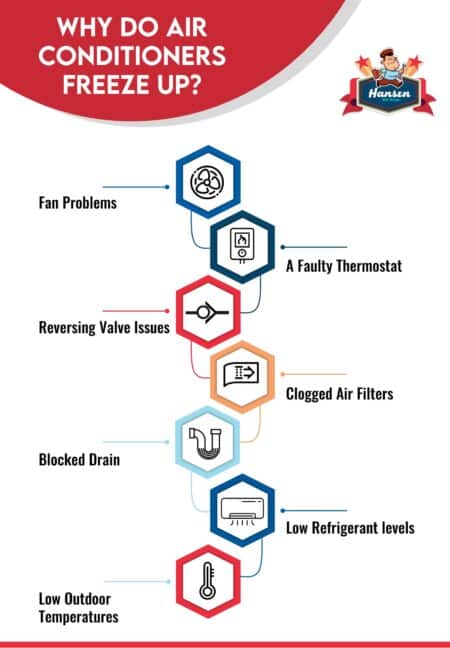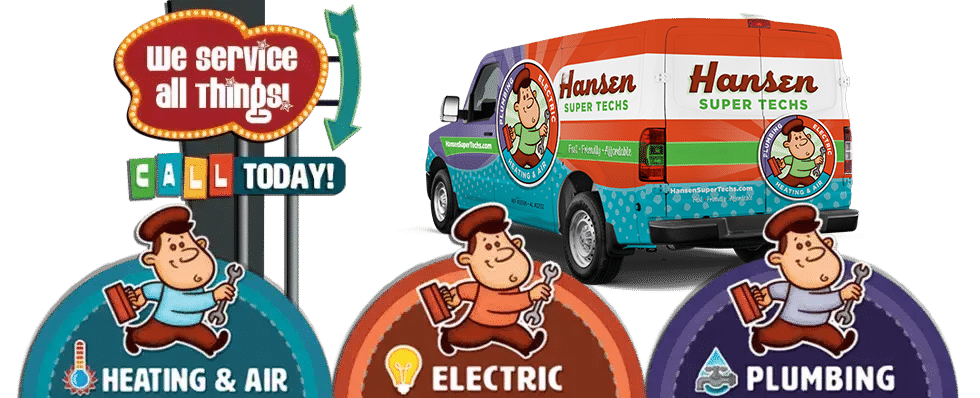Why Do Air Conditioners Freeze Up?
One of the most frustrating and common things that can happen to your AC system is a freeze-up. It occurs when a layer of ice builds up outside of your air conditioning unit, which prevents the appliance from cooling the air effectively. It also puts lots of stress on the unit’s compressor, leading to costly repairs or a compressor replacement in the long run.
It can be challenging to pinpoint what’s causing your cooling system to freeze. However, the only way to properly address the issue is to determine its source. Whether you’ve got a central air unit or a window AC, the causes, effects, and solutions to the freezing problem are all the same. Here are the main reasons that your AC unit might be freezing up and how you can solve the problem.
1. Fan Problems
One of the reasons that your air conditioning system might be freezing up is a malfunctioning fan. Some indicators of a faulty fan are a fan propelling slower than normal, generating noises, or not moving at all. In addition, if the fan has loose connections or is damaged or burnt-out, there will be little cooling and no airflow in the system.
The fan is usually attached to the evaporator. If the evaporator unit gets clogged or blocked, the fan won’t function either. As a result, condensation will build up on the AC coils with time, causing them to freeze. So, ensure that there are no items placed near the evaporator unit. Also, get your evaporator coils washed and cleaned by a reputable HVAC service to solve this problem.
2. A Faulty Thermostat
Your thermostat controls temperatures in your living space by switching the blower off or on, depending on the set temperatures. However, if there’s a glitch in the room sensors or thermostat, your system will overwork. For example, malfunctioning room sensors will not give the right signals to your unit to turn off when the temperature indoors doesn’t need cooling. As a result, your air conditioner will constantly run, causing the condenser coils to freeze up.
A faulty thermostat will not only lead to increased electricity bills but also result in energy waste. Avoid running or overusing your air conditioning unit overnight. You should only set your thermostat at a low level during overly humid days or heat waves. Contact an AC service to replace or recalibrate the thermostat for you.
3. Reversing Valve Issues
It’s rare for the reversing valves to have problems. However, if there’s an issue, you need to contact your AC technician immediately. The reversing valves can malfunction because of internal leaks in the valve, broken coils, or a valve that’s stuck in a heating or cooling position. The technician will check your unit and also fix the compressor and the coils to solve the problem.
4. Clogged Air Filters
Dirty filters are probably the primary cause of any faulty AC unit. Debris and dirt can accumulate in the air filters, blocking out cold air and straining your system. Anything that restricts airflow in the appliance will cause the evaporator coils to freeze up. It can also cause the air conditioner to blow warm air.
If you don’t take action, dirty filters can quickly spread dust, allergens, and other harmful bacteria into your living spaces, leading to poor indoor air quality. Poor air quality can weaken your lungs with time, leading to serious health complications like asthma. To solve this issue, check your filters regularly. If you notice dirt beginning to form, clean the filters. We recommend replacing or cleaning your AC filters once a month, especially if you’re running your unit continuously.
5. Blocked Drain
Water vapor usually condenses into liquid during the cooling process, and a drain removes the water from the evaporator coils and directs it in a drain pan. Without good drainage, the condensed water will sit inside of your AC system and eventually freeze. Frozen coils might block the drain line further, leading to a major freeze. The more ice that builds on your coils, the less efficiently the water drains, causing the entire AC system to freeze up. It’s also worth noting that debris such as leaves and twigs or a pest invasion can block your air conditioner’s drainage. Contact your AC technician to inspect the drain to avoid major freezing damages.
6. Low Refrigerant levels
The refrigerant in the AC unit is responsible for pressure and temperature changes. In a properly functioning air conditioning unit, the evaporator coils expand the refrigerant in it, cooling the coils pretty fast. That helps with the transfer of heat since the refrigerant absorbs heat from your indoor air and sends it outdoors. However, when the refrigerant levels are too low, there will be less heat transfer, making the coils freeze.
One of the primary causes of low refrigerant levels is leaks. Refrigerant leaks can originate from holes in the condenser coils’ U-bends, broken joints in the refrigerant line, and evaporator coils that rub against each other. If you regularly add new refrigerants to the AC unit, you may be dealing with refrigerant leaks. To prevent damage to your air conditioner’s compressor, turn off the system, and contact an AC company to fix the leak.
7. Low Outdoor Temperatures
Air conditioners are designed to operate in a certain temperature range. A sudden fall or rise in outdoor temperatures can put more strain on your AC unit. That’s because it will have to work harder to maintain optimum temperature indoors and pull in air.
The indoor temperatures should be below 80 degrees, while the outdoors should range between 70 and 100 degrees. If the outside temperatures are too low, the pressure in your AC unit will drop, causing the system to freeze up. Sometimes, your air conditioner might also turn off completely, forcing you to restart the entire system.
To solve this problem, turn your thermostat to the fan setting to allow the coils to thaw. However, ensure to take the necessary precautions against damage caused by the melting ice. You can invest in a dehumidifier, a window AC unit, or a portable AC unit with a dehumidifying or drying mode. These systems pull moisture and heat from the air and drain the moisture while returning the heat to your rooms. They’re suitable for cold, damp climates when you want less clammy and humid air in your house. In other words, these units dry the air in your home without cooling it.
Contact the Professionals at Hansen Super Techs
A freezing air conditioning unit will not only malfunction, but it can significantly damage your system, leading to costly repairs and a shortened lifespan. If you notice ice building up on your AC unit, contact an HVAC professional from Hansen Super Techs immediately. Our highly qualified team of technicians will restore your home’s comfort by solving the freezing issue. From one-time fixes to regular maintenance packages, our company is the solution to any AC-related issue you may have.
We also specialize in electric, heating, and plumbing services. If you’re a resident of Theodore, AL, or a surrounding area, give us a call today to request any of our services.


